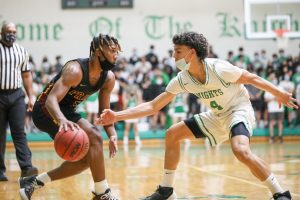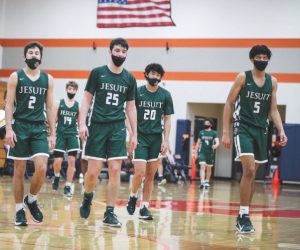- Slug: Sports-Section 7 Basketball, 990 words.
- Photos available
By Henry Greenstein
Cronkite News
PHOENIX – From Friday to Sunday, nearly 200 high school basketball teams from across the western United States will squeeze onto 12 courts in one marquee venue.
This weekend marks the return of the Section 7 tournament. It played out in 2019 at high schools across the Valley, was postponed in 2020 and will now be housed under one retractable roof at State Farm Stadium.
The goal of Section 7 is to provide an opportunity for athletes to play with their high school teams in front of college basketball coaches. It shares its name with the National Federation of State High School Associations region that contains Arizona. The tournament debuted in 2019 after the NCAA designated two June weekends for “scholastic events” in response to recommendations from the Rice Commission on College Basketball.
Matt King, executive director of the Arizona Basketball Coaches Association and one of the event’s lead organizers, said seeing players face scholastic competition gives college recruiters a different analytical perspective compared to watching Amateur Athletic Union (AAU) club basketball.
“Not to say either is better or worse, but they’re two modes of evaluation,” King said. “A lot of time in an AAU environment, you’re going to see 10 Division I players on the floor, at the highest level. In this environment, you’re going to see Division I players that are playing with the team that they play with every single day throughout the entire year.”
There will be no shortage of college coaches at this year’s tournament; the Section 7 website touts over 400. And while they hail from all levels of competition, many represent Division I schools, including luminaries such as tournament runners-up Gonzaga University and nine Pac-12 schools.
This exposure will be critical for players like Jack Payne, a senior guard for Owyhee High School in Meridian, Idaho, one of two teams representing the Gem State.
“It means a lot to me that I even have this chance,” Payne said. “A lot of people don’t get this chance, especially from Idaho.”
The opportunity is important more broadly for Owyhee, a school that has yet to open, with a team that played its first games together just weeks before the Section 7 tournament. Coach Andy Harrington said the team’s talented roster and his track record from Middleton High School, along with prior connections, helped the Owyhee Storm earn an invite from King.
“Idaho kind of gets downplayed because it’s a smaller state and a lot of people don’t know where it is but there is some good basketball here,” he said. “I’m hoping that we can go represent.”
The Storm will have a daunting road ahead, as their City of Glendale bracket features Arizona stalwarts such as Salpointe Catholic High School. Harrington and Payne said they’re excited to face out-of-state competition and build cohesion heading into next season.
Cohesion is critical even for reigning state champions. Sunnyslope High School, fresh off its first 6A championship victory, has plenty of work to do this summer, said Vikings coach Ray Portela.
“You have certain players back, but you never know how they’re going to react or work with certain new members of the team,” he said, “so it’s definitely a challenge.”
Portela said that Sunnyslope winning its bracket at the 2019 edition of Section 7 helped his players attract attention. Since then, many players have missed potential recruiting opportunities due to the COVID-19 pandemic, bolstering the importance of Section 7 this summer.
“(Recruiters) couldn’t leave their campuses, it just kind of slowed everything down, and just stopped the kids from being seen,” he said.
Portela added that besides being much more convenient for the college coaches, playing in State Farm Stadium is a unique opportunity for the athletes. One out-of-state rival from his team’s bracket agreed.
“Definitely just got a little bit of a wow factor,” said Strake Jesuit coach Dominic Amorosa, “to be able to play in a stadium that hosts Super Bowls and Final Fours and big-time events.”
Strake Jesuit, of Houston, is the only team in the tournament from Texas. Amorosa said Section 7 is important for both juniors and seniors on his team.
“It gives our 2022s a chance to have an exposure weekend, prior to the AAU live period in July,” he said, “and then it gives our 2023s a chance to see – this is what it looks like.”
Sunnyslope and Strake Jesuit are part of the Juneteenth by ServRx bracket, which features steep competition, including teams such as Ribet Academy and Mater Dei High School from California and Cherry Creek High School from Colorado. Their games begin at 7:15 p.m. Friday. The first matches start at 10:45 a.m. In total, the tournament will feature 12 divisions, including one containing 16 girls basketball teams from Arizona.
“We’re not going to have an event with just boys,” King said. “We want to have both women and men represented, and we’re not going to do it without that.”
King lamented that Division I women’s coaches aren’t allowed to come and watch (the June scholastic window currently applies specifically to men’s basketball), and said he hopes they will be able to one day. For now, he said he still wants the event to give the girls access to a prominent venue and “elevate their experience.”
Initial tournament play continues through Sunday, and the top 32 teams will move on to an exclusive second weekend of matchups from June 25-27 at Brophy College Preparatory.
Much of the marketing for Section 7 concentrates on State Farm Stadium, however. The venue will also host the men’s Final Four in 2024, and the organizers of Section 7 are drawing an explicit connection between the two basketball tournaments.
“There’s going to be a kid who plays at Section 7 who plays in those games,” King said. “There’s going to be a coach who comes to evaluate kids at Section 7 that coaches in those games.
“And their dream starts now.”
For more stories from Cronkite News, visit cronkitenews.azpbs.org.

